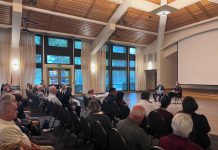For the life of me, I cannot figure out why some people have a
hard time determining what is real and what isn’t. It is as if they
had to go to Google Maps, look up their own address, and then check
the Google photo to see what it looked like. Whatever happened to
walking outside and turning around?
For the life of me, I cannot figure out why some people have a hard time determining what is real and what isn’t. It is as if they had to go to Google Maps, look up their own address, and then check the Google photo to see what it looked like. Whatever happened to walking outside and turning around?
We seem so willing to accept other’s interpretation of things rather than developing our own powers of observation. We hear the echo of Groucho Marx’s “Who are you going to believe, me or your lying eyes?”
Some issues present such a challenge to a person’s world view that it is much easier, even comfortable, to close your eyes and accept only those authorities that reinforce your mental picture of reality. Such seems to be the case with climate. It is a subject where myth prevails no matter how many times the myths are disproved. Myths fly around the Internet from blog post to blog post, each one referencing an earlier version as its authority. Even the often cited list of “650 scientists who oppose global warming” is itself a lie, made up by someone, spread by your tax money through the offices of Sen. James Inhofe and now possessing mythical qualities.
Trace backwards, clicking on link after link you will find one that references a page or a Web site that no longer exists and the “Ah, ha” moment. “They” have had it taken down to hide the truth. I never learned who “they” were but they have to have been really active.
The poet, Wallace Stevens, wrote that “The imagination is man’s power over nature.” Maybe that is what is at work here, our imaginations creating a world the way that we want it to be rather than looking at the world that is and seeing it in all its wonder. Why would we only experience the glories of PBS’s Nature when nature is all around us or consider the environment only when we see some plastic washed up on the beach at Pescadero rather than every time we take a breath, no matter where we are.
This refusal to look at the world as it really is becomes a great concern when it governs the acts of a person of power and influence. Such, it seems, is the case with George Will who is now involved in a controversy over his recent columns on climate change and whether it is due to the actions of man. Will’s columns, first published in the Washington Post, are echoed in hundreds of other papers around the country including the San Jose Mercury News. As such, they are read, discussed and become themselves the authority for another cycle of myths that perpetuate his and our failures.
I am sure that Will did not do all of this himself. He has a staff of researchers who, knowing what the Great Man wants to say, find for him the references to back up those assertions.
You would have hoped that the Washington Post would have had the courage to admit a mistake and to correct the factual errors in Will’s column. However, they did not, deferring to Will and Will’s staff who did the fact checking and validation of sources for him and so absolve all of editorial responsibility.
It has fallen to others to show just how far Will’s imagination has carried him. Andrew Revkin in the New York Times reported that Will was factually wrong in his description of the current condition of the Arctic ice-pack and that was a key justification for Will’s piece. Chris Mooney, a reputable science journalist and author of three books on the subject, has submitted a factual rebuttal Will’s February 16 column to the Post. I expect their non-publication, since it would not do to anger the Great Man.
Journalism is failing at science. CNN laid off their entire staff of science journalists. NBC took over the Weather Channel and then laid off their entire climate team. The Mercury News has one of California’s best environmental reporters working other subjects at a time when we are facing connected crises in both climate and water management. They are being replaced by a “he said, she said” style of writing that easily equates fact and fiction if they express differing viewpoints.
Print journalism gives us an opportunity to have the time to reflect and consider big issues. When they begin to fail their duty to differentiate fact from opinion, as did the Post, they fail us all and none more than our our descendants whose very life depends on our making good decisions. We need good journalists, good editors and organizations willing to make the effort to get the facts right.







